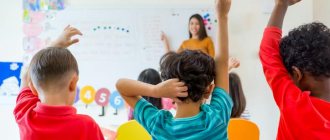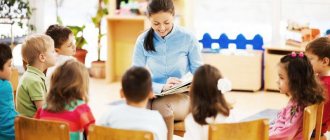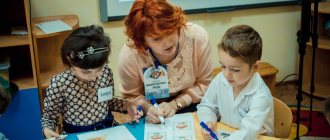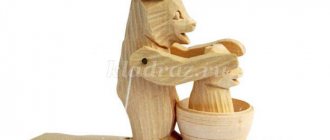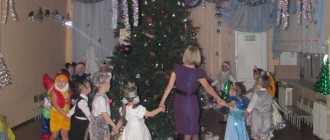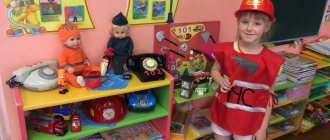Report on self-education of a kindergarten teacher
The role of the microenvironment in the formation of social and moral qualities of preschool children. Development of communication skills through role-playing games
Author: Efimenko Svetlana Nikolaevna, teacher of the speech therapy group of MBDOU d/s No. 18 “Alenka”, Safonovo Description of the material: Dear colleagues, I bring to your attention a report on self-education on the topic: “The role of the microenvironment in the formation of social and moral qualities of preschool children. Development of communication skills with the help of role-playing games.” This material will be useful for teachers of preschool institutions. Goal: increasing your theoretical level, professional skills and competence on this topic.
The topic of self-education is “The role of the microenvironment in the formation of social and moral qualities of preschool children.
Development of communication skills with the help of role-playing games” was not chosen by chance. Since recently teachers and parents have increasingly noted with alarm that many preschoolers experience serious difficulties in communicating with peers, self-education on this topic is very important to me. In order to achieve mastery in teaching, you need to study a lot, get to know the child’s psyche, and the age-related characteristics of children’s development. Various aspects of the game were constantly the subject of careful and detailed study. Games in the moral education of children are considered in the works of L.S. Vygotsky, A.N. Leontiev, J. Levy, R. Kaitz, J. Piaget, K.D. Ushinsky, J. Huizinga. A psychological analysis of the role of play in moral education and personality development was given by L.S. Vygotsky, A.N. Leontiev, S.L. Rubinstein, D.B. Elkonin. Game as a means of forming a personality and developing its potentials is explored in the works of N.P. Anikeeva, O.S. Gazman, T.E. Konnikova, D.V. Mendzheritskaya, I.I. Frishman, S.A. Shmakov and many others . Working with preschool children, I came to the conclusion that many children need correction of relationships with peers. And since play is the leading activity of preschool children, the easiest way to do this is in the process of role-playing play. Plot-role-playing play plays a leading role in the formation of positive relationships among children and the formation of positive moral qualities in the personality of preschool children. In order to start work, I studied methodological literature: • As a basis for my work, I took the Basic General Educational Program of Preschool Education “From Birth to School” (N.E. Veraksa, T.S. Komarova, M.A. Vasilyeva. • “Moral education of preschool children in kindergarten” edited by V. G. Nechaeva and T. A. Markova (I identified and set goals and objectives for myself in gaming activities aimed at developing the moral qualities of preschoolers.) • “If you sow a habit, you reap character "L.I. Kaplan (I learned and applied in my work the experience of a teacher in the formation of useful habits in children). • "Raising children through play" A.K. Bondarenko, A.I. Matusik (this manual helped me master the methodology of involvement children into the game, helping them understand moral norms and ideas). • “A Child in Kindergarten” by T.I. Babaev (the book helped me in choosing games and game situations for the formation of moral qualities). • “The Role of Play in Raising Children” A .P. Usova (the book helped me understand the importance of play in the moral development of preschoolers). • “Organization of story-based games in kindergarten” N.Ya. Mikhailenko, N.A. Korotkova (organization of independent play activities) • “Story-role-playing games for preschool children” N.V. Krasnoshchekova. (organization of independent play activities) Based on the literature studied above, I chose the path that seemed to me the most correct - to cultivate the following moral qualities in preschoolers: culture of behavior, humane relationships (kindness, responsiveness, caring attitude), the desire to provide help through play. In accordance with modern requirements for preschool education and upbringing, I formulated the goal of my work - the formation of positive interpersonal relationships in a child in the process of role-playing games. To achieve this goal, I set the following tasks: • studying psychological and pedagogical literature on this issue; • creation of a subject-based gaming environment that meets modern requirements and promotes the development of independent gaming activity; • mastering modern technologies and methods of organizing the game; • development of long-term planning and conducting role-playing games in a speech therapy group; • classification of games for the education of moral qualities and preparation of their support; • carrying out diagnostics for the education of moral qualities; • increasing the competence of parents in the matter of moral education of children; • increasing personal competence in this matter. The game can contribute to the development of moral qualities only if a number of conditions are met: • proper organization and management of the game; • correctly formulated motivation; • a variety of children's games aimed at developing the positive qualities of preschoolers, their aesthetics and attractiveness; • taking into account the individual characteristics of the child and his interests. In solving the assigned tasks, the following methods and techniques were used: • organization of life and play developmental situations that provide children with the opportunity to learn the experience of moral behavior and a friendly attitude towards peers and close adults; • performances with toys, demonstrating to children examples of correct behavior and relationships in kindergarten and in the family; • communication and joint activities with the teacher - as a means of establishing trust, enriching social ideas and interaction experience; • observation of the actions and relationships of adults in kindergarten (cook, nanny, doctor, janitor, teacher); • imaginative games - imitations, round dances, theatrical, active, didactic, construction - for the development of emotional responsiveness and the joy of communicating with peers; • reading poetry, fairy tales on the themes of kindness, love for parents, caring for animals (educational methodology “Kind Fairy Tales”); • examination of plot pictures, illustrations in order to enrich social ideas about people (adults and children), orientation in the immediate environment (in a group, preschool educational institution and in the family); • plot-based - role-playing games that unite children with a common plot, playful actions, and the joy of reflecting the roles of adults. Working on the topic, I developed planning for role-playing games, taking into account the capabilities of the kindergarten and taking into account the characteristics of preschool children in the speech therapy group. I also made a card index of plot-based role-playing games. In the process of work, “Shop”, “Hairdressing Salon”, “Library” were designed, which are replenished and expanded taking into account age characteristics, development and formation of the stages of formation of the game. In preschool age, role-playing play is the leading activity, and communication becomes its part and condition. Children, of course, do not always find the right ways to establish relationships. Conflicts often arise between them, when each defends his own desire, regardless of the desires and rights of his peers. But it is at this age that the child discovers the truth that without empathy for another, without concession to another, he himself remains a loser. In play, the child finds himself in a relationship of dependence on other children. In my work, I used the following principles for organizing play in a children's group: • developing children's independence and self-organization; • developing the ability to agree on the theme of the game; • independent distribution of roles; • discussion of the main plot development; • preparing the playing environment. In February of this year, I developed a synopsis of a plot-based role-playing game in the preparatory group “Defenders of the maritime borders of our Motherland - military sailors!”, The goal of which was to develop in children the ability to combine various thematic plots into a single game plot.
During the organization and conduct of the plot-role-playing game, the following tasks were solved: educational:
- to cultivate friendly relationships in children, a sense of collectivism;
— to cultivate an emotional — positive attitude towards soldiers, which is expressed in imitation of them in agility, speed, courage, and the desire to be like them; educational: - to form patriotic feelings in children based on familiarization with the military actions of our people; — expand the range of children's games; — learn to play together (discuss the plot, come up with new roles and game actions); - help create a game environment taking into account the theme of the game and the imaginary situation; - learn to name your role, verbally define the events depicted; - activate children's vocabulary: captain, ship, navigator, boatswain, radio operator, radiogram, route, fleet, anchor, porthole, cook; developing:
- develop creative thinking, imagination, fantasy in children;
- develop speech and role interaction, coherent monologue and dialogic speech; - develop strength, agility, endurance, motor and communication abilities. Thus, role-playing play can become the basis for developing positive communication skills between a child and his peers. In conclusion, I would like to note that systematic work on the development of communication skills through role-playing games helps improve the social status of the child. The nature of future relationships of preschool children in society largely depends on how communication skills are developed and the ability to manage one’s emotions. Assessment of children's awareness of moral standards in a speech therapy group for the 2014–2015 academic year
.
1. High level:
*beginning of the school year - 20% *end of the school year - 60%
2. Average level:
*beginning of the school year - 30% *end of the school year - 30%
3. Low level:
*beginning of the school year - 50% *end of the school year - 10% I consider the most important indicator of the effectiveness of my work: when words of gratitude are heard from children, without my prompting, positive and negative actions are evaluated, when a child is sincerely happy when achieving a positive result in a game, all this lets me know that small “sprouts” of morality are sown in the souls of children, forming conscious moral actions. I believe that the direction of work I have chosen will help children in the future adapt painlessly to the new conditions of school life.
We recommend watching:
Designing an individual educational route for a preschooler (according to social and personal development Self-education of a preschool teacher Self-education of a teacher on the topic: Children's experimentation Long-term plan for self-education of a kindergarten teacher
Similar articles:
Professional development of preschool teachers in a small town
How and in what way can the process of professional development be organized?
In order to be in the trend, a modern teacher needs to systematically follow news in the field of preschool pedagogy and psychology, become familiar with the best pedagogical practices, be in constant communication with colleagues, work to increase general erudition and improve pedagogical skills, and become familiar with the legal and regulatory framework. preschool education and analyze your own professional experience.
Additional teacher development is a mandatory part that is included in the self-education plan of a preschool teacher according to the Federal State Educational Standard. The plan helps to systematize the work, is a reflection of the effectiveness of the teacher’s activities, and creates opportunities for prospects for communication with children.
How to choose a topic? Tips for educators
The self-education plan for a preschool teacher according to the Federal State Educational Standard requires careful preparation, during which a lot of questions arise. The main issue is the choice of topic. A methodologist or senior educator mainly helps with this, but the teacher can also make an independent choice, depending on the relevance and practical significance of the topic of educational activity.
In determining their readiness for self-education, young specialists are also recommended to familiarize themselves with the map of G. M. Kodzhaspirova. The self-education plan for a preschool teacher according to the Federal State Educational Standard must be drawn up taking into account the following recommendations:
- When studying any issue, you need to research several sources in order to form your opinion.
- It is advisable to work with library catalogs and material from the Internet in order to obtain the necessary literary source.
- When searching for material, it is important to focus on innovative methods in education.
- Communication and exchange of experience with colleagues is an important aspect of teacher self-education.
An individual self-education plan is drawn up in two types:
- Annual planning
- Long-term planning, which provides for annual revision of the educational activity plan
If an individual self-education plan is drawn up according to the second type of planning, you can use the project method appropriate to the age of the children. Long-term planning must certainly include current issues of preschool education in dynamic development.
Preview:
How to draw up a self-education plan for a preschool teacher
What is self-education and why is it needed? This process is understood as the specially organized, systematic and amateur cognitive activity of a teacher, which is aimed at achieving certain socially and personally significant goals. Why is it needed and why is a plan for self-education of a preschool teacher drawn up? Self-education is closely related to the specifics of pedagogical activity, its role in society, as well as to the currently fashionable continuous education, which is associated with the constantly changing working conditions of teachers. The whole point of this process is to satisfy cognitive activity, and its essence is to master the culture of thinking, the ability to independently, without any help, work on one’s improvement, and overcome problems, including professional ones.
Sample plan for self-education for a preschool teacher
Topics for self-education are chosen by the teacher himself. The senior teacher can also recommend them. The period within which the topic is studied can be from one to three years. The following stages are distinguished:
*Diagnostic. Contents of the work: analysis of possible difficulties, formulation of problems and study of literature.
*Prognostic. Its essence: defining goals, objectives, developing an optimal system and possible measures aimed at solving the problem at hand, predicting possible results.
*Practical. Work: introduction and dissemination of advanced pedagogical experience, as well as a system of measures aimed at solving the problem at hand, clear formation of a method complex, tracking the entire work process, its current and intermediate results, adjusting the work.
*Generalizing. Work: summing up results, processing the results
results of your own research on the chosen topic, provision of materials.
* Implementation. The essence of the stage: the use of the acquired new experience by the teacher in the process of his further work, the dissemination of the experience gained.
Forms for presenting results.
At the end of each stage of work, the teacher draws up and presents his
results. The forms in which he can do this are also included in the plan.
self-education of a preschool teacher. They can be the following: -an interview with the head of the methodological association or with a senior teacher; — speaking at a meeting of a methodological association or at a pedagogical council; — open classes; — an essay, presentation or individual creative project. It is worth noting that at the beginning of the school year, after the teachers have decided on the topics, a general plan for the self-education of the senior preschool teacher should be drawn up.
Any work must have a clear structure; we offer you one of the design options for what a self-education plan for a preschool teacher might look like. First, indicate the title of the work, for example: “Individual self-education plan” (indicate the year). Next, indicate your position. It is worth noting that the design of the self-education plan for a teacher of a junior group, middle or senior group will not fundamentally differ from one another. Next, indicate your full name. teacher, his education, as well as advanced training courses. Then you should indicate the topic of self-education, the problems to be worked on, the deadlines, as well as tasks and goals.
Drawing up a self-education plan: stages
Let's look at a few points that you need to pay attention to. The self-education plan for a preschool teacher according to the Federal State Educational Standard can be drawn up taking into account the following factors:
- justification for choosing the topic;
- the relationship between the topic of work and the goals and objectives of the preschool institution;
- preliminary work, including the study of methods and programs for preschool education and upbringing;
- choosing forms of interaction with preschoolers;
- own methods;
- expected result of working on the topic;
- conclusions and dynamic statistics of child development;
- prospects for improving performance;
- results of self-education.
